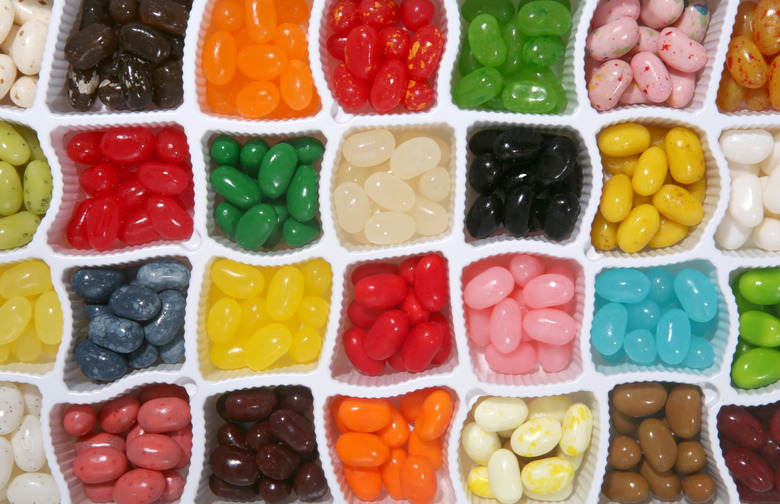These 25 Things Are Slowing Down Your Metabolism Slideshow
These 25 Things Are Slowing Down Your Metabolism
We know why you're here: You're terrified of your slowing metabolism. Honestly, we don't blame you. It makes sense that we're so scared when we hear such negative messages about what happens once it slows: If I have a slow metabolism, I'll be gross. Tired. Lazy. Depressed. Acne-covered. The list goes on.
Metabolism is just the process of the body using food and nutrients to carry out its usual biological processes. As we age, our metabolism naturally starts to slow down. We get more sluggish, our skin sags, and we put on a few pounds.
This is all completely natural.
However, there are lifestyle choices and changes that could accelerate this process. People have gone to great lengths to speed up their metabolism. In popularized health discussions, metabolism has been inextricably tied to weight and weight loss. Slow metabolism equals fat. Fast metabolism equals thin, lean, and healthy. As a result, with a lean body in mind, many people set their minds to revving their metabolisms up and start on an attempt to diet, full speed ahead.
However, this could backfire: Many of the traditional dieting methods and foods we think are making us thinner are actually slowing our metabolism way, way down.
Is your workout slowing your metabolism? Maybe, if you're doing it wrong. What about eating low-carb?
The truth is, having a fast metabolism may or may not result in a smaller body. However, we do know that a fast metabolism will make you more energized, vivacious, clear-headed, clear-skinned, and hormonally balanced.
You don't want to sabotage that. If you avoid these 25 things, you won't have to.
Artificial Sweeteners
You probably know to avoid these compounds — they've been linked to brain degeneration, diabetes, and now a slowing metabolic rate. According to Dr. Sabyasachi Sen, an associate professor of medicine and endocrinology at George Washington University, "there is increasing scientific evidence that these sweeteners promote metabolic dysfunction." Metabolic dysfunction is a fancy way of saying that you're disrupting your metabolism's usual speed.
This makes sense. When you eat artificial sweeteners, your taste sensors believe that you're eating something up to 500 times sweeter than cane sugar. Your metabolism goes ahead and prepares itself to handle that load.
It speeds way up and then has nothing to process — resulting in an immediate crash.
Calcium Deficiency
Calcium deficiency has been linked to a decelerated metabolism. Many people avoid milk, cheese, or other forms of dairy for various reasons, but either adding them back into your diet or taking a calcium supplement can help heighten your metabolic rate.
Counting Calories
When you're counting your calories, it's likely that you're restricting your intake to a number lower than you're used to eating. Your count might snowball to get lower and lower, even if that lower number starts to feel uncomfortable. When your body receives fewer calories, it naturally slows down in response.
Additionally, eating the same amount of calories every day can cause your metabolism to lag — especially if the amount you're eating is less than you're burning. Life doesn't always look the same every day. Some days you move a lot, some days you move only a little, some days you're sick, etc.
Your calorie numbers shouldn't look the same, either. To keep your metabolism moving quickly and efficiently, you want to react to your body's needs on a day-to-day basis and eat intuitively. If you're hungrier, eat more. If you're less hungry, eat less. It's that simple.
Dehydration
Water is necessary for almost every function in your body. Therefore, when you don't get enough water, those processes slow down, stalling your metabolism. The health benefits to water are endless — keep a bottle with you at all times as a helpful reminder to drink up.
Dieting
When you go on a diet, you restrict the food that you eat. This often, if not always, results in ignoring your body's hunger and fullness cues, cravings, and other ways it's trying to speak to you. If your body needs more fats, it's going to be hungry for something fatty. If it's yearning for carbs, you're going to feel like eating something with carbs.
Your metabolism is on full speed when your body feels nourished, satisfied, and satiated. When your body is deprived, its metabolism slows down: It wants to preserve the limited amount of necessary nutrients it's getting.
Reject dieting and listen to your body instead. When you foster mutual trust with your body and your cravings, it will trust you enough to speed up its metabolism and keep you feeling your best.
Drinking Alcohol
We know that alcohol contains empty, nutrition-less calories, but did you know that the substance actually dramatically impedes your metabolic rate? According to an article by Dr. Mauro Di Pasquale, alcohol slows your metabolism by 73 percent.
When drinking alcohol, try to keep your intake more moderate and have a couple of drinks at a time. This will minimize your metabolism-wrecking consequences without putting too much of a damper on your night.
Eating Lots of Raw Vegetables
Raw vegetables are, of course, perfectly healthy to include into your diet — in moderation. Since they have large amounts of cellulose, a type of fiber that's extremely difficult for our stomachs to digest, and often have little to no carbs, protein, or fat, eating them in excess is metabolism sabotage.
To balance out the effort your stomach needs to expend to digest raw vegetables, eat them alongside carbohydrate, fat, and protein-rich foods. These other foods will give your body the energy to process the micronutrients those vegetables have to offer.
Eating Low-Carb
Carbohydrates are your body's main source of energy for daily function and building muscle. If there isn't any energy that's quickly available, your body must slow down its metabolism to keep up. You'll start to feel less energized and more sleepy, which may also result in poorer performance if you do choose to exercise.
Additionally, the more muscle you can build using those carbs, the higher your metabolism.
Fuel with carbohydrates such as whole grains and starches from vegetables for lasting energy your body can use all day, without experiencing a sluggish sugar crash.
Eating Low-Fat
Polyunsaturated fats have been shown to enhance the activity of genes that influence your body to dip into its stores of fat for energy. Walnuts, avocado, and other fat-filled foods make great additions to your diet if you want a speedier metabolism.
Full-fat dairy could be twice as effective for increasing your metabolic rate because it adds the necessary calcium to speed things up.
Exercising Too Much
You can exercise too often by not taking rest days, exercise for too long a period of time, or exercise too intensely. All of these mistakes can dramatically affect your metabolism.
According to performance development trainer Corey Stenstrup, in an environment of high stress where one is exercising too much, the body receives constant signals that it a) needs to slow down, and b) is going to need to expend a lot more energy exercising again very soon. In response, it's going to slow down and conserve energy — energy that's likely going to be stored as fat instead of metabolized.
Calories in does not equal calories out: Your body is too smart for that. A good way to tell if your exercise is too intense or too lengthy is to check in with your exhaustion levels after your workout. According to Dr. Mercola, feeling exhausted instead of energized after a workout is a sure sign of overtraining.
Going Hungry
Have you ever met one of those people who eats nothing all day but eats a ton at dinner? Even though they're eating enough calories in their day and eating healthy foods, they're still severely disrupting their metabolism.
Despite the fact that they know they're eating later, their bodies don't. In anticipation of needing to survive without food for longer, their metabolism stalls. When they do finally eat, their metabolism is crawling — using fewer of the calories they're eating and storing the rest as fat.
Going on a Cleanse
Juice cleanses often involve replacing meals with smoothies, juices, and "wellness shots" — all of which contain fewer calories, fats, and proteins than a full meal. Remember that a caloric deficit, a lack of protein, eating low-fat, and dieting all slow your metabolism. "Cleansing" involves incorporating all of these unhealthy habits at once, undermining your metabolism to the extreme.
Having “Cheat Days”
This occurs when you're on a diet and designate one day to eat and drink whatever you want. It's your "cheat day" — you cheat on your diet and go crazy.
There are two things about this that are problematic in terms of your metabolism. The first is the deprivation of foods you crave for a majority of the week (see the earlier slide about dieting). The second occurs on the cheat day itself — because you've been feeling so deprived, you're more likely to overdo it once you allow yourself those "off limit" foods.
You're likely to eat junk and treats in such an excess that your metabolism can't keep up. It'll start to go at full speed in an attempt to process all the calories you gave it. But then, you wake up the next morning and your body is in for an unwelcome surprise: You're restricting your food again. Your speedy metabolism, which had anticipated a continuously large amount of food, will crash in response.
Instead, allow yourself treats throughout the week and avoid labeling foods as either "good" or "bad." Then, you will naturally eat all kinds of foods in healthful, metabolism-friendly moderation.
Hormone Imbalances
Hormones regulated by your thyroid control metabolism, body temperature, muscle strength, and even appetite. When these hormones are out of whack, so is your body's fat-burning process.
Some signs of hormonal imbalance due to your thyroid include fatigue, weight gain, depression, and unexplained muscle pain. If you suspect your thyroid may be experiencing issues, consult an endocrine doctor.
Lack of Exercise
According to WebMD, exercise has a huge effect on your metabolism. While you're exercising, you're clearly burning through more energy, but even after you're finished exercising the benefits continue rolling through your day. If you do a high-intensity interval workout, the extreme boost in your heart rate induces a flare-up of your metabolism that can last up to 24 hours. If you did a more strength-based or endurance-focused workout, the muscle you build with those exercises increases your metabolism. The more muscle you have, the speedier it gets.
Additionally, exercise has been shown to decrease stress levels and balance hormones — two more factors that can get your metabolism moving.
Not Eating Enough
When you're in a caloric deficit, your metabolism slows to conserve the limited energy it was given. Your body wants to remain at a weight and energy level at which it's most comfortable — when you try to argue with that by not eating enough, it fights back.
In a four-day study, the metabolic rate of people who ate 1,114 calories per day slowed more than twice as much as of those who consumed 1,462 calories daily.
To keep your metabolism up, eat when you are hungry and until you are full.
Not Taking Time to Rest
Whether you're not taking days off, working yourself too hard in the office, or failing to get enough sleep, you're making a crucial error: You're stressing your body out. It's not sure when it will get to relax again. In order to take care of itself through whatever trials await it in the future, it's going to start conserving energy and slow down your metabolism.
Meditation, doing yoga, and sleeping the full eight hours per night have been shown to result in weight loss, but it's easy for busy people to allow rejuvenating activities like these to fall by the wayside. Don't make that mistake, and don't underestimate the power of some R&R.
Protein Deficiency
Protein is essential for building and repairing muscles. The more muscle you have, the higher your metabolism. You've probably heard the phrase "muscle burns fat." In a way, this is true. Muscle requires more upkeep and energy to maintain than stagnant fat cells. Therefore, the muscle on your body burns more calories and uses more energy, increasing your metabolism. Without protein, you can't build those muscles. Here's why protein-packed snacks are your best friend, especially on busy days.
Sleeping Too Little
According to a review in the International Journal of Endocrinology, people functioning on a sleep deficit don't metabolize sugar as well as people who get enough sleep. This might be due to the body reacting to exhaustion by preserving energy.
Lack of sleep can also increase the stress hormone, cortisol, which has a number of other adverse side effects on how you feel.
Stressing Out
When you're stressed, you release high levels of the hormone cortisol. According to an article on Livestrong, "constant elevated levels of stress can lead to sleeplessness, depression, and obesity." Stress is also likely to lead to overeating and lack of exercise.
To keep your stress levels low, pick up a mindfulness-based activity. According to a study published in the Journal of Psychosomatic Research, mindfulness has the potential to help individuals of all backgrounds to remain balanced and healthy.
Skipping Breakfast
This is the main reason why nutritionists hail breakfast as the most important meal of the day. You've probably heard people say that breakfast "jump-starts your metabolism." It basically does — while you're sleeping, your body goes through a long period of time without eating. During this time, it slows down its metabolism to a crawl. Once you give your body nutrients again, it gets revved back up — an effect that remains throughout the rest of your day.
Skipping Snacks
According to an article in Everyday Health, "Blood sugar dips three to five hours after you eat. Eating small, frequent snacks keeps your metabolism revved up and helps normalize blood sugar." When you let yourself go hungry, your metabolism begins to delay; your body isn't sure the next time it's going to get to eat. Eat frequently to keep your body trusting that it doesn't have to preserve more energy than it's using.
Spending All Day Inside
When you're in the sunlight, your skin soaks up essential vitamin D. Vitamin D is necessary for your body to preserve and repair muscle tissue. The more muscle you have, the faster your metabolism — so get out there!
Too Much Cardio
Spending hours upon hours on the elliptical machine is not only inefficient and potentially stressful for your body, but it also fails at building any muscle. Pick up some weights (even if they're light ones) and incorporate some strength-building movements into your routine. Yoga, dance, hiking, and swimming are also great ways to build strength.
Warm Weather
There's a reason you crave creamy soups, buttery potatoes, and other comfort foods during winter. When the weather is cold, your body has to work harder to stay at its much warmer, cozier temperature. This results in a speedier metabolism because your body has to work harder, even when it's at rest.
Ok, so now you know what not to do, but what should you be doing to help your metabolism's speed? For 25 foods to eat to speed up your metabolism, click here.


























